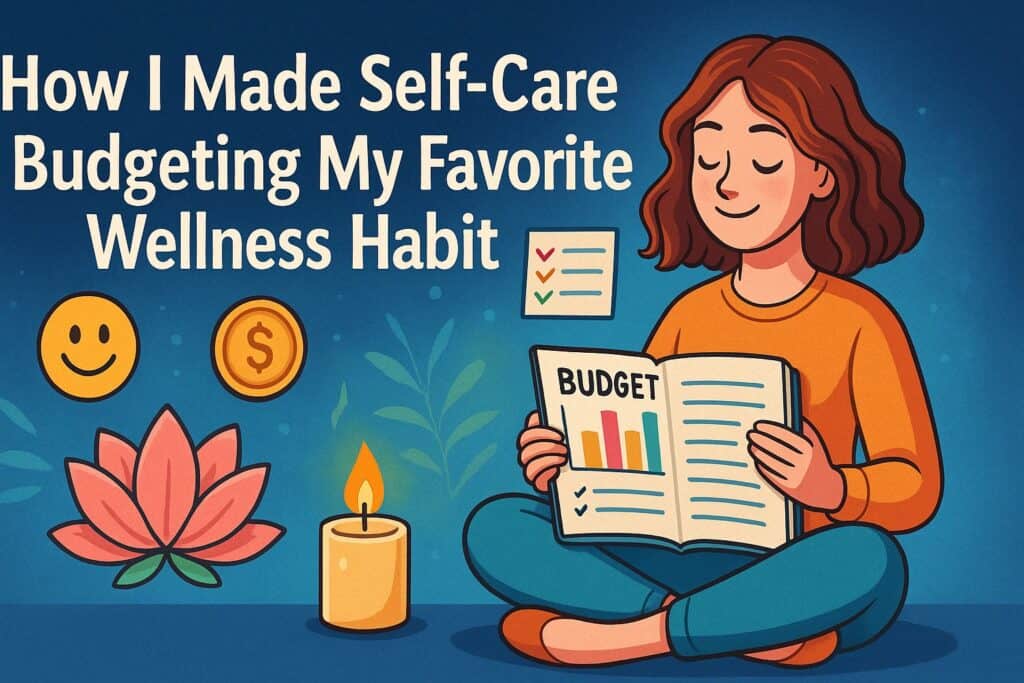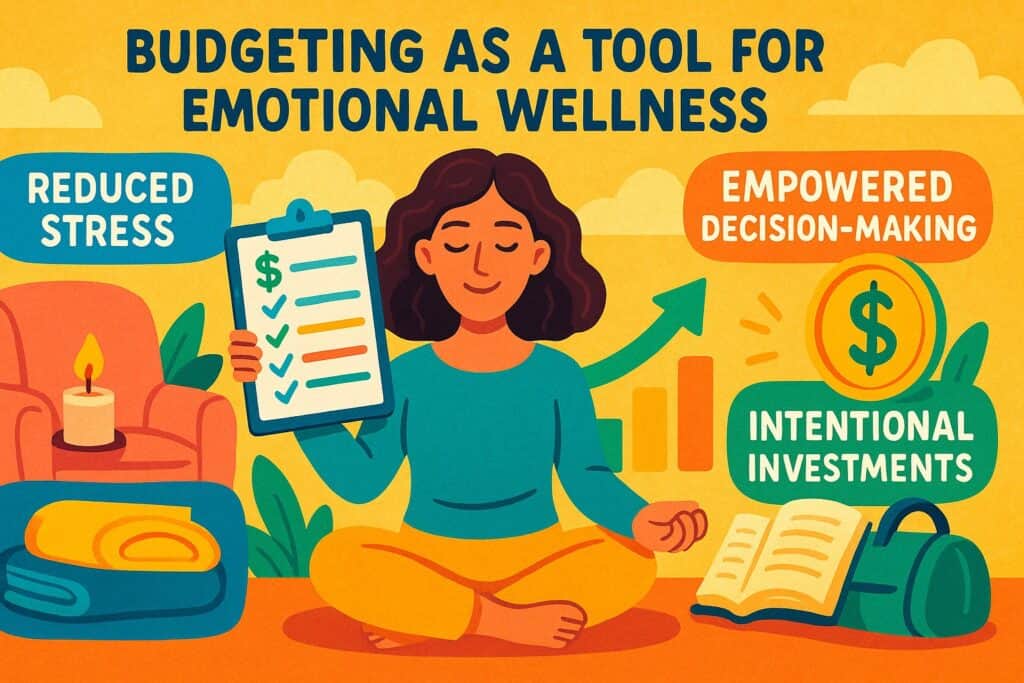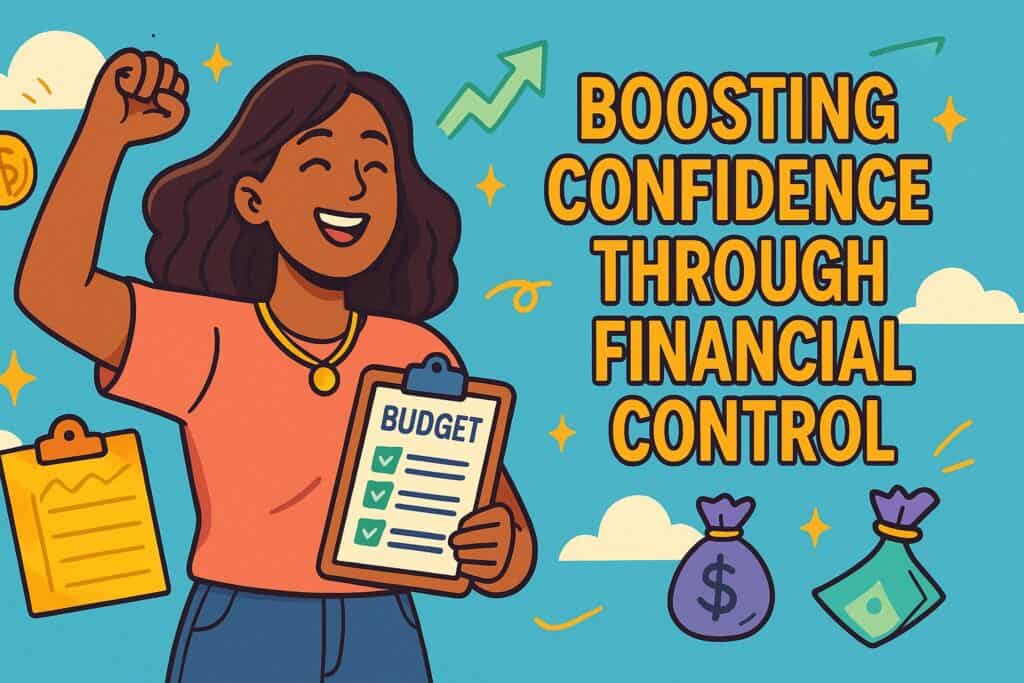I used to think budgeting was the opposite of self-care – stressful, boring, and just another chore on my endless to-do list.
But honestly? That mindset only left me feeling drained and out of control. It wasn’t until I flipped the script and started treating my budget like a self-care ritual that everything clicked.
What if your monthly budget could be a way to calm your mind and nurture your goals, instead of something you dread?
I’ll show you how I went from avoiding budgets to making them one of my favorite routines.
By shifting focus and using simple self-care budgeting tips, I created a personal finance self-care routine that’s both empowering and surprisingly calming.
If you’re tired of feeling stuck, this guide is like hitting the reset button.
The Shift: Viewing Budgeting as Self-Care
When was the last time you looked at your budget and felt a sense of calm?
For most people, budgeting feels more like a chore that’s dripping with stress. However, your budget doesn’t have to be that way.
By shifting how you think about it, you can turn managing your money into a practice that nurtures your well-being, much like journaling or taking a long bath at the end of the day.
Let’s break down this mindset shift and look at how budgeting can become a tool, not a trigger.
Breaking Down Budget Aversion
If you’ve ever cringed at the thought of looking at your finances, trust me, you’re not just the only one. For many, budgeting feels heavy. Why?
- Stress and Overwhelm: Seeing numbers stack up or bills that never end? That can be panic-inducing.
- Feelings of Deprivation: The mere word “budget” sparks this image of cutting out lattes and saying goodbye to fun. It feels restrictive, like a diet, but for your wallet.
- Information Overload: Balancing spreadsheets, tracking expenses, calculating savings. It’s easy to feel like it’s “too much.”
But here’s a reframe that works for me. Instead of seeing a budget as a list of “nos,” think of it as a guide that outlines all the “yeses” in your life. It’s not a limitation, it’s a plan for possibilities.
I also like to remind myself that perfection isn’t the goal. You don’t need to be the boardroom CEO of your personal finances; you just need clarity.
If burnout is peeking in, simplify the process. Start with one expense or one category. Even baby steps can carry you miles forward.
For stress-related money tips, you might find this stress management guide helpful. It’s packed with practical strategies to regain balance.
Budgeting as a Tool for Emotional Wellness
Have you noticed how much calmer you feel when something big is crossed off your to-do list?
That’s the same vibe budgeting brings when you take charge of your money.
Here’s what happens when you start treating your budget as a self-care tool instead of a spreadsheet:
- Reduced Stress: Knowing where your money is going eliminates that dreaded paycheck-to-paycheck anxiety.
- Empowered Decision-Making: Confidence rises when you control your finances. Every dollar has a purpose, and you’re the one directing the show.
- Intentional Investments: Whether it’s therapy, gym memberships, or even quiet nights in with a good book—a thoughtful budget lets you prioritize what matters to YOU.
Feeling in control of money creates space to mentally exhale. Imagine fewer impulsive spends and more thoughtful choices aligned with your self-care goals.
You’re not just managing your finances; you’re designing the life you want.
Want tailored advice? If you’ve ever felt like your budget just isn’t working or your self-care routine needs a refresh,
I’ve got something perfect for you. I created a fun quiz designed to help you pinpoint your budgeting blind spots and uncover your unique self-care style.
Take the Money and Self-Care Quiz now and get personalized tips that match your vibe.
Creating a Self-Care-Oriented Budgeting Routine
Budgeting as self-care might sound like a wild idea, but trust me, it works. When you pair the numbers with mindfulness, your budget transforms from a rigid tool into a reflection of your values and goals.
It’s not just about saving money, it’s about living better, with less stress and more joy.
Here’s how to build a self-care-oriented budgeting routine step by step.
Step 1: Define Your Self-Care Priorities
Start by listing the activities or experiences that make you feel refreshed, happy, or calm. Things like yoga classes, journaling, skincare splurges, or weekend hikes.
These are your self-care staples. Now, think about how they fit into your overall financial picture. Prioritize what truly enriches your well-being.
Here’s a tip: Split your list into two categories: non-negotiables (what you must have for balance, like therapy or gym memberships) and occasional treats (that fancy coffee you love but don’t need every day).
When you see your priorities clearly, it’s easier to align your budget with them.
If you need inspiration for affordable ways to nurture your self-care, check out 10 Easy Guilt-Free Ways to Prioritize Self-Care on a Budget.
Step 2: Build Financial Joy Categories
Let’s breathe some positivity into budgeting by renaming and reframing your categories. Don’t just slot money into “Savings” or “Entertainment”.
Try something that resonates personally, like “Wellness Focus,” “Feel-Good Fund,” or “Personal Joy.”
For instance:
- Fun Money: For hobbies or small splurges that lift your spirits.
- Wellness Wallet: Think gym memberships, spa days, or that acupuncture session you keep putting off.
- Growth Goals: Maybe it’s a course, a book, or professional coaching that fuels your long-term dreams.
Give your budget categories heart. It’s like writing your own story, where every dollar is a character working toward a happy ending.
I also recommend looking into the concept of a self-care fund, which can be a dedicated portion of your budget.
For practical guidance, read about creating one in 11 Savvy Secrets to Saving Smart Without Missing Out on Life.
Step 3: Use Budgeting Tools That Feel Good
Paper planners, colorful spreadsheets, budgeting apps. Find what makes you excited to track your finances.
If it feels intuitive and visually enjoyable, you’re more likely to stay consistent.
For instance, I love using apps like Mint or PocketGuard because they’re user-friendly and give me visual cues on my spending trends.
Some people even design their own systems with highlighters, stickers, or drawings. It’s okay to make it fun. It’s your budget, after all.
Think of it like decorating your space; you’ll look forward to revisiting it when it reflects your personality.
For more advice on financial self-care tools, visit 15 Financial Self-Care Tips: The Key to Confidence and Balance.
Step 4: Reflect and Reward Yourself
Budgeting is about discipline and celebration. Take time every month to review your progress. Did you stick to your plan? What went well? What felt out of sync?
Adjust as needed, but don’t forget to also treat yourself.
Setting rewards for milestones like a little luxury after hitting a savings goal, turns your budget into a source of motivation rather than pressure.
This reflection process builds a positive relationship with money. It’s like planting seeds and watching them bloom. The more you invest in your financial self-care, the more you’ll see your efforts flourish.
By the way, if you’re looking for a deeper dive into balancing self-care and finances, here’s a wonderful read on Practicing Self-Care on a Budget.
If you’ve ever felt like your budget just isn’t working or your self-care routine needs a refresh, I’ve got something perfect for you.
I created a fun quiz designed specifically to help you pinpoint your budgeting blind spots and uncover your unique self-care style.
Take the Money and Self-Care Quiz now, and you’ll get personalized tips that genuinely match your personality. No one-size-fits-all advice here!
The Emotional Benefits of Budgeting as Self-Care
It’s easy to dread budgeting. It feels rigid, stressful, and often overwhelming. But what if we flipped the narrative?
Viewing a budget as part of your self-care routine can do more than just improve your finances.
It can also provide emotional peace, confidence, and a new level of mindfulness in your daily life.
Let’s break this down into the powerful emotional rewards that come from budgeting with intention.
Less Stress, More Stability
Imagine this: You’re standing on a boat in stormy seas, no anchor in sight. It’s chaotic, unpredictable, and exhausting. That’s what life often feels like when finances are unorganized.
Budgeting is the anchor that allows you to stabilize the chaos and navigate those rough waters with clarity.
When you know exactly where your money is going and have a plan in place, it’s like flipping a switch.
The overwhelming “what-ifs” disappear and are replaced with crystal-clear awareness. Here’s how budgeting helps relieve stress:
- Reduced financial surprises: Unexpected bills are a common stressor. With a budget, you can plan ahead for repairs, seasonal expenses, or even small indulgences, cutting out those “How will I afford this?!” moments.
- Aligned goals: Knowing that each dollar is working toward something meaningful, whether it’s self-care, a vacation, or paying off debt, shifts your mindset from dread to empowerment.
- Emergency protection: A strong budget often includes a safety net for life’s curveballs, giving you extra emotional stability during tough times.
If you’re curious about creating a budget that helps you say goodbye to financial stress, check out these practical money-saving tips. It’s never too late to start planning for peace.
Boosting Confidence Through Financial Control
Have you ever set a goal, worked toward it, and then finally achieved it? It’s one of the most empowering feelings in the world.
That’s exactly what budgeting offers, but not just in financial terms. It builds emotional and psychological strength too.
When you stick to a budget, you’re more than just saving money. You’re proving to yourself that you’re capable of creating structure and making thoughtful decisions.
Here are some real wins your confidence can experience:
- Clarity in spending: Tracking your spending creates mindfulness. Instead of impulse buys, you start making purchases based on what truly aligns with your values, and that intentionality feels amazing.
- Successful milestones: Whether it’s saving for something big or staying consistent with your self-care fund, achieving those small (or large) financial victories can be a solid confidence booster.
- Empowered future choices: Once you’ve mastered budgeting, the feeling of control spills over into other areas of decision-making. It’s like flexing a muscle—the more you do it, the stronger it becomes.
For help finding the perfect organizational tool to keep building confidence, explore my guide to the best budgeting apps available today.
With the right tools, you can take financial control one step further.
If you’ve ever felt like your budget isn’t working or your self-care routine needs a refresh, I’ve created a fun tool just for you.
Take this Money and Self-Care Quiz now and discover personalized tips designed to make budgeting work for YOU. It’s not about perfection. It’s about growth and confidence in your journey.
Real-Life Strategies: Making Budgeting a Comforting Ritual
If you’re like me, the word “budgeting” probably used to bring a wave of dread. But what if I told you it’s possible to turn this chore into a soothing, even empowering ritual?
Here’s how you can create a calming, personal budgeting experience.
Set the Mood for Budgeting
The environment you create directly impacts how an activity feels.
When I first shifted my perspective on budgeting, I realized I needed to make it a part of my self-care time rather than just “another task.” Setting the mood works wonders.
Here are a few tips to make budgeting feel less like a chore and more like an indulgent retreat:
- Use aromatherapy: Light a calming lavender-scented candle to ease tension.
- Pick a playlist: Create a background of soft lo-fi beats or instrumental tracks that help you focus.
- Minimize distractions: Leave your phone in another room, sit in a clean space, and pour yourself a warm cup of tea.
This process transforms the atmosphere and surprisingly, it makes budgeting something you can look forward to. It’s like designing your own mini spa session, but for your financial clarity.
For other calming self-care practices, check out this list of simple self-care techniques.
Make It a Family or Solo Bonding Activity
Budgeting should not feel isolating. Whether you prefer spending this time on your own or sharing it with loved ones, reframing it as a bonding activity can shift your mindset entirely.
- For solo rituals: Treat budgeting as sacred “me time.” Pour a glass of wine, grab your favorite notebook, and think of this as journaling for your finances. It’s about connecting with your goals and celebrating your wins.
- With loved ones: Turn it into a monthly check-in. Set a date night with your partner or family where you collectively decide financial priorities over dinner or dessert.
When I included my partner in budget discussions, we started discovering how aligned (or not!) our financial dreams were. It became less about the numbers and more about working as a team.
You can dive even deeper into setting mindful intentions in collaborative spaces with reflection techniques like these self-love exercises.
Tie Budgeting to Personal Purpose
If budgeting feels disconnected from what truly matters to you, it’s hard to stay motivated.
For me, the game-changer was aligning my budget with my aspirations.
Whether it’s building a dream career, planning travel adventures, or simply securing peace of mind, tying numbers to your purpose makes every spreadsheet entry feel meaningful.
Here’s how you can connect your budget with your goals:
- Write down your values. What truly drives you? Is it freedom, growth, relationships, or something else?
- Identify how your money can support those values. For example: Are you allocating for education? Saving for experiences? Building an emergency fund?
- Name your accounts or categories creatively. Instead of “Savings,” call it “Future Stability Fund” or “Dream Life Account.” When you check in on these numbers, they feel less transactional and more like a direct investment in YOU.
I’ve found that when I remember why I’m budgeting, whether it’s for a weekend getaway or better sleep knowing bills are covered, it feels more rewarding.
If you need help defining what truly makes you happy, take a peek at this guide to discovering personal fulfillment.
Turning budgeting into a purposeful practice isn’t just any ritual. It’s a comforting reminder that you’re prioritizing your well-being and future.
If you’ve ever felt like your budget just isn’t working or your self-care routine could use a refresh, I created something that’ll fit right into your journey.
Final Thought – Self-Care Budgeting My Favorite Wellness Habit
Budgeting doesn’t have to be something you fear or avoid. With the right approach, it can become a deeply comforting and empowering routine.
By aligning your financial habits with your personal values and self-care priorities, you’re choosing to honor your well-being in a meaningful way.
When I reframed my budget as an act of self-care, it stopped feeling like a chore and started feeling like a gift I was giving myself.
If you’re ready to do the same, why not take the next step? Take the Money and Self-Care Quiz and uncover your personalized path to turning financial wellness into a form of self-love.
Love what you just read? Share this post with someone who might need it!
By sharing, subscribing, and spreading the word, we can build a supportive community for anyone ready to find balance and thrive.
Help a friend feel lighter. Pin, text, or drop this in your group chat. Together, we can create empowering routines that feel amazing!
Know someone who’s ready to ditch money stress? Pass this on! Building strong financial habits starts with inspiration, so let’s share the love.
Confidence grows when we support each other. Share this to remind someone they’re capable of building a life full of abundance and self-care.
Let’s make self-care budgeting habits work for all of us—together.





